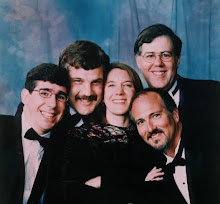I am going to express a minority opinion. Apparently Union Ave. Opera's new production of HMS Pinafore has been receiving rave reviews and I wish I could jump on the bandwagon, but I just can't. I found the production very disappointing. Now, it wasn't the performance per se. The leads were mostly very good. Josephine and the Captain were the standouts, but Ralph and Sir Joseph were also quite excellent. I liked Little Buttercup's voice and she I think was a good actress but she needed to dial it back a bit. Not only that but the chorus was terrific. They used a rather small chorus but it was amazingly well balanced even so. It wasn't the set, or the costumes all of which were very good. So then what is it?
The problem was with the director. I got the distinct impression that this director at the very least did not trust the material that he had to work with. Consequently we were subjected to constant over-direction. It started with the overture. Why can't the overture stand on its own, we will figure out soon enough that Ralph and Josephine have a thing for each other. We simply don't need to be presented with this during the overture. But no, bits and business filled the stage during the overture completely distracting us from the music. But that was only the beginning for what followed was a never ending cascade of silly and irrelevant bits that the director inserted in an effort (I suppose) to be funny. Except, the material as it is is already really funny.
A little story: Back in the days when Gilbert walked on this earth, his leading baritone Rutland Barrington started adding bits to add to the humor. Gilbert insisted he stop. "Why?" asked Barrington, "The people are laughing." Gilbert responded something to the effect that "If you went on stage and sat on a pork pie people would laugh but it adds nothing to the show and is ultimately completely distracting." And, this is what this director gave us: a heaping serving of pork pie!
Several other egregious examples - The 2nd act entracte begins with a brief orchestral reprise of Little Buttercup's song from act 1. There is a melancholy to this brief orchestral moment that beautifully sets up the very melancholy song that the Captain sings to open act 2 ("Fair Moon to Thee"). It is a beautiful song and was beautifully sung in this performance. But the effect was ruined by the senseless stage business that filled the entracte. It was not necessary to see the crew and the girls (sister, cousins and aunts) chasing each other and dancing. But for the me absolute worst moment occurred during what should be the highlight of the entire opera both musically and dramatically: "The Hours Creep On Apace" followed by the aria "A Simple Sailor Lowly Born." Gilbert and Sullivan are at their absolute best here. This is also the most serious moment in the show as it deals with the serious issue of social class. We might think this is irrelevant today, but it is not, we have a lot of class issues that we struggle with. And not only is it still a serious issue, but what the text points out is that perhaps even more important are the pre-conceptions that one has about class which prevents people from being able to relate to one another in a constructive way. And on top of it Sullivan's music is simply glorious. But we were not able to appreciate the profundity of this moment as this director filled the aria with bits that completely distracted the audience from the text and from the singer, who was also glorious by the way (it is a darn shame and she deserves an apology for this!) We don't need to see a future Ralph carrying two babies around while he is wearing a t-shirt and smoking cigars. We get it, because it is all in the text! And we don't need to watch Sir Joseph and the Captain acting pompous, we have already had quite enough of that, thank you very much. The result was laughter that covered the singer and destroyed to moment! Inexcusable!
But that is not all. Presumably while Josephine is singing the Captain and Sir Joseph are drinking, and drinking and drinking and by the time they get to the Bell Trio they are totally drunk. It was simply not funny to watch two drunk guys stumble around on stage during what should be the funniest moment of the entire show. In fact, this trio usually gets encores. Mercifully we were spared this and the drunk men were able to stumble off stage. Well, except for the Captain who amazingly was able to sober up immediately for his duet with Dick Deadeye. And Hebe must have been ready with coffee back stage because Sir Joseph was also amazingly sober at his next entrance as well.
I was not going to write anything but I was so disappointed and upset by the way this director ruined Josephine's aria and the Bell Trio I felt I had to write. Look - to all directors - Gilbert knew what he is doing. He doesn't need you to add anything. He is amazingly funny as it is in the script. If you have a great cast (as they have for this production) all you need to do is do the show seriously and it will be incredibly funny and even a little profound. This production was neither funny or profound. But it was at least very well sung, so that is something (though for some reason the orchestra was terribly soft. The singers covered them almost for the entire evening. What I could hear was very good but I think they could play out a bit more!)
Here is a video clip of Josephine's 2nd act aria - Valerie Masterson:
The Hours Creep On Apace
Carmen Aldrich
8 years ago



